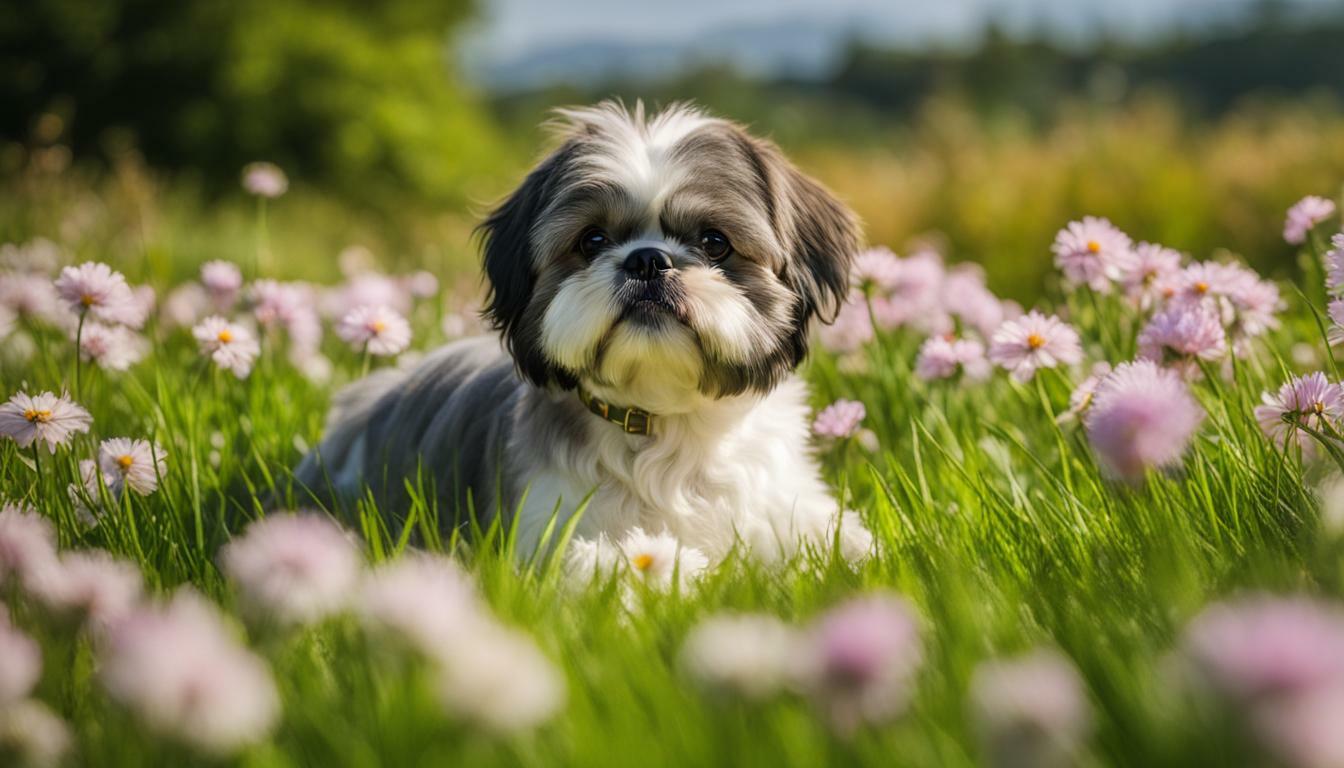If you’re considering adding a Shih Tzu to your family, or if you’re already a proud owner, it’s important to understand the unique needs of this beloved breed. From their daily care to their health and training requirements, this comprehensive Shih Tzu ownership guide will provide you with all the information you need to give your furry friend the best possible life.
- Learn about the history and personality traits of the Shih Tzu breed.
- Discover the essential aspects of daily Shih Tzu care, including grooming, exercise, and diet.
- Understand the importance of training and socialization for a well-behaved Shih Tzu.
- Recognize common Shih Tzu health issues and implement preventive care measures.
- Create a safe environment for your Shih Tzu by pet-proofing and eliminating potential hazards.
Understanding the Shih Tzu Breed: An Overview
If you’re considering welcoming a Shih Tzu into your home, it’s important to understand their unique characteristics and temperament. Shih Tzu breed information will help you decide if this breed is right for you.
The Shih Tzu is a small, affectionate breed that originated in China and is known for their long, luxurious coat. They have a distinct flat face, large round eyes, and a friendly, outgoing personality. Typically weighing between 9-16 pounds, Shih Tzus are adaptable to both city and country life and are well suited for apartment living.
While they may be small in size, Shih Tzus have a big personality. They are loyal, affectionate, and thrive on human companionship. Shih Tzus are also known to be playful and energetic, making them a great choice for families with children.

However, it’s important to note that Shih Tzus can be prone to certain health issues, such as ear infections, dental problems, and respiratory issues due to their flat face. It’s important to stay up to date with regular check-ups and vaccinations to keep your Shih Tzu healthy.
Overall, the Shih Tzu is a beloved breed known for their affectionate personality, adaptability, and beauty. With proper care and attention, they can make an excellent companion for many years to come.
Shih Tzu Care Tips: Meeting Their Daily Needs
Shih Tzus require daily care to maintain their health and happiness. Here are some essential tips to ensure your beloved companion thrives:
| Aspect of Care | Tips |
|---|---|
| Living Environment | Provide a comfortable living space that is free from hazards. Ensure your Shih Tzu has access to clean water, a cozy bed, and appropriate toys. |
| Exercise | Though Shih Tzus don’t require as much exercise as larger breeds, they still need daily walks and playtime to maintain a healthy weight and stimulate their minds. Aim for at least 20-30 minutes of exercise per day. |
| Grooming | Shih Tzus have a long, luxurious coat that requires daily brushing to prevent matting and tangling. Bathe your Shih Tzu every three weeks and trim their nails regularly. Clean their ears and brush their teeth to maintain their oral hygiene. |
| Diet | Feed your Shih Tzu a high-quality, balanced diet that meets their nutritional needs. Avoid table scraps and overfeeding, which can lead to obesity. Consult with your veterinarian to determine the appropriate feeding schedule and portion size. |
| Health | Regularly visit the veterinarian for check-ups and vaccinations. Monitor your Shih Tzu for any signs of illness, such as vomiting, diarrhea, or lethargy. Provide preventive care, such as flea and tick control, to keep your Shih Tzu in optimal health. |
By following these Shih Tzu care tips, you can ensure that your furry friend receives the love and attention they deserve.
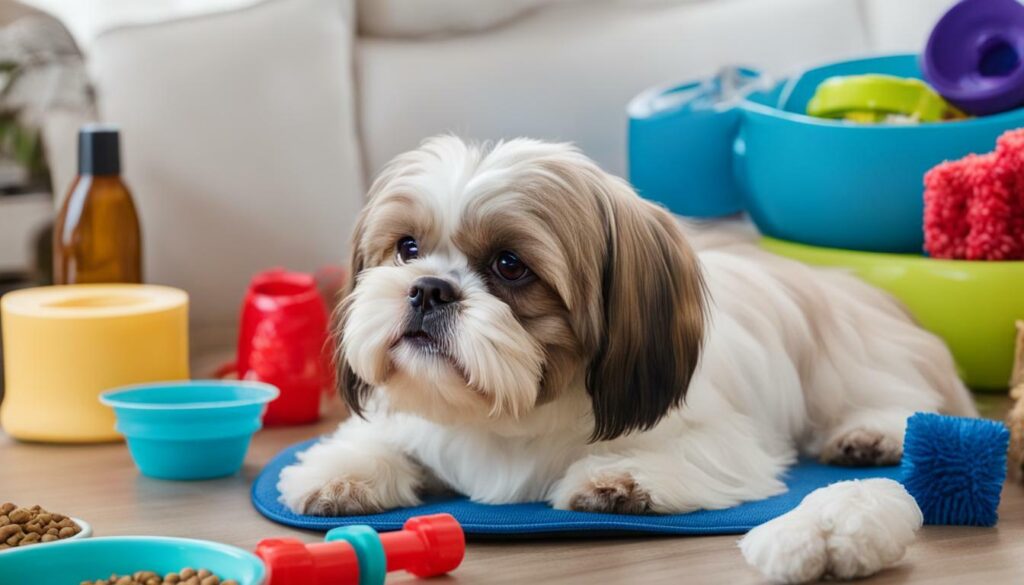
Shih Tzus have a luxurious, long coat that requires regular grooming to keep it healthy and tangle-free. Establishing a grooming routine early on in your Shih Tzu’s life is essential to maintain their coat’s condition. Here’s everything you need to know to create a comprehensive Shih Tzu grooming routine.
Brushing
Daily brushing is necessary to keep your Shih Tzu’s coat tangle-free. Start with a pin brush, focusing on one section at a time. Gently detangle any knots with a slicker brush, taking care around sensitive areas like the ears and tail. Finish with a comb to ensure all tangles are removed.
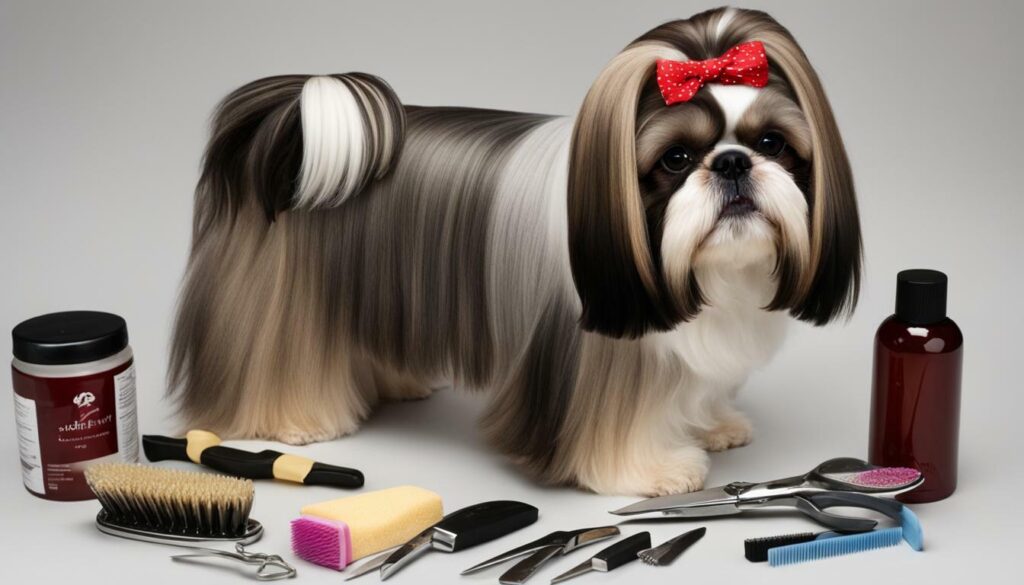
Bathing your Shih Tzu every three to four weeks will keep their coat clean and free of dirt and bacteria. Use a mild shampoo, taking extra care around the face and eyes. Rinse thoroughly to avoid any soap residue.
Ear Cleaning
Shih Tzus are prone to ear infections, so regular ear cleaning is crucial. Use a gentle ear cleaning solution and cotton balls to clean the inside of the ear flap and ear canal. Avoid using cotton swabs to prevent any damage to the ear canal.
Nail Trimming
Trimming your Shih Tzu’s nails monthly is essential to prevent overgrowth and discomfort. Use a sharp, small pair of scissors or nail clippers to clip the tips of the nails. Take care not to cut too close to the quick, which can cause bleeding and pain.
By following a regular grooming routine, you can ensure that your Shih Tzu’s coat is always healthy and shiny. The bonding time spent during grooming can also promote a stronger bond between you and your furry friend.
Shih Tzu Training Advice: Building a Well-Behaved Companion
Training is a crucial aspect of owning a Shih Tzu. Despite their lovable nature, Shih Tzus can be stubborn and independent, making training essential for building a well-behaved companion. Here are some Shih Tzu training tips to help you along the way:
Start Early
Begin training your Shih Tzu as soon as possible. Puppies have a short attention span, so keep training sessions brief and fun. Basic obedience commands such as “sit,” “stay,” and “come” are essential for a well-behaved Shih Tzu.
Be Consistent
Consistency is key when it comes to Shih Tzu training. Use the same commands and hand signals every time, and reward your dog for good behavior. Avoid rewarding bad behavior, as this can confuse your Shih Tzu and make training more difficult.
Use Positive Reinforcement
Positive reinforcement is one of the most effective training methods for Shih Tzus. Reward your dog with treats, praise, and affection for good behavior, and never resort to physical punishment or yelling.
Be Patient
Training a Shih Tzu can be a challenging process, but it’s essential to remain patient and consistent. Don’t expect your dog to learn everything overnight, and be prepared to repeat training sessions as needed.
Socialize Your Shih Tzu
Socialization is essential for a well-adjusted Shih Tzu. Expose your dog to new people, pets, and environments in a positive and controlled manner. This will help prevent behavioral problems and ensure your Shih Tzu becomes a friendly and well-behaved companion.
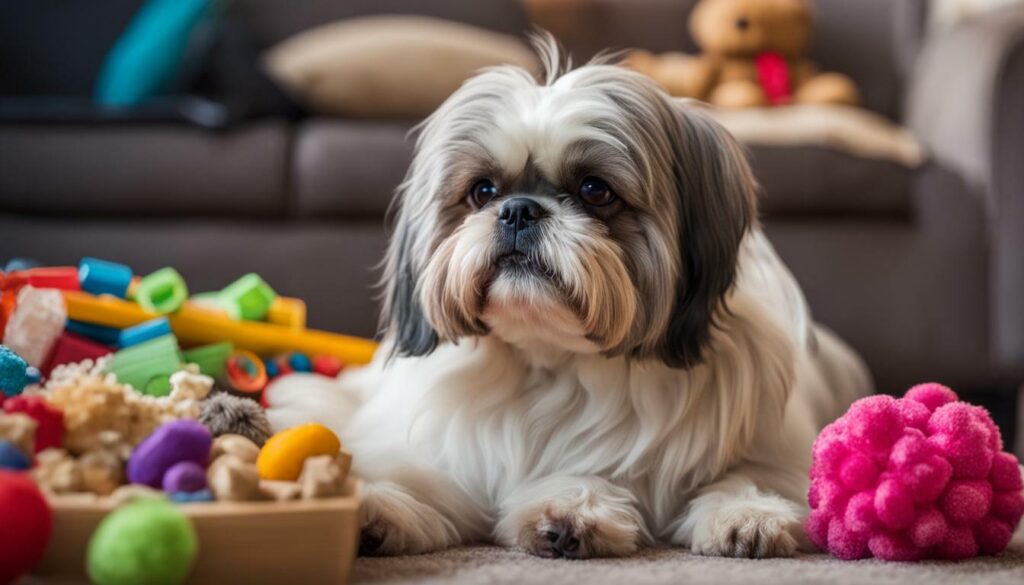
By following these Shih Tzu training tips, you can build a strong bond with your furry companion and ensure they grow into a well-behaved and obedient dog. Remember to stay patient, consistent, and positive, and you’ll be rewarded with a loving and loyal companion for years to come.
Shih Tzu Health Care: Maintaining Optimal Well-being
Shih Tzus are generally healthy dogs, but they are prone to some health issues, such as eye problems, dental issues, and respiratory problems. As a responsible owner, it’s crucial to take care of your Shih Tzu’s health and well-being to ensure they live a long and happy life.
The first step in maintaining your Shih Tzu’s health is to schedule regular check-ups with your vet. This will ensure that any potential health issues are caught early and treated promptly. Your vet can also advise you on the best preventative care measures for your furry friend. For example, they may recommend vaccinations or flea and tick prevention.
In addition to regular vet visits, there are a few things you can do at home to keep your Shih Tzu healthy. Grooming is a critical aspect of their health, as it helps to prevent skin irritation and matting. Regular brushing, bathing, and ear cleaning can help keep your Shih Tzu’s coat shiny and healthy.
Another essential aspect of Shih Tzu health care is a proper diet. A well-balanced diet that meets your Shih Tzu’s nutritional needs is key to maintaining their optimal health. Talk to your vet about the best dog food options for your Shih Tzu and determine the appropriate portion size for their activity level and age. Avoid overfeeding your Shih Tzu, as they are prone to obesity.
Finally, it’s essential to keep an eye out for any signs of illness in your Shih Tzu. Symptoms such as excessive lethargy, loss of appetite, or vomiting can be early indications of health issues. If you notice any concerning symptoms, contact your vet right away to get their advice.

By taking proper care of your Shih Tzu’s health, you can ensure that they live a happy and comfortable life by your side.
Shih Tzu Socialization: Nurturing a Friendly Pet
Socialization is critical for your Shih Tzu’s development, so it’s essential to start training as early as possible. Proper socialization will ensure that your furry friend develops into a friendly and well-behaved companion. It can also reduce the potential for behavioral issues later in life.
Begin socializing your Shih Tzu as soon as they are fully vaccinated, usually around 12-16 weeks old. Introduce them to various people, dogs, and animals in a controlled and calm environment. This exposure will help your Shih Tzu become comfortable with new sights, smells, and sounds, so they don’t become fearful or aggressive in unfamiliar situations.
When socializing your Shih Tzu, always supervise and reward them for good behavior. Positive reinforcement is an effective method to encourage your dog to behave correctly. Praise and treats are great rewards for good behavior, but avoid punishing or scolding your Shih Tzu for mistakes. Positive feedback will help your Shih Tzu develop a positive association with new experiences.
If your Shih Tzu displays fear or anxiety around new people or animals, consult a professional trainer or behaviorist. They can provide additional guidance to help your Shih Tzu overcome their fears and become a confident and well-adjusted pet.

Remember, socialization is a lifelong process for your Shih Tzu. Continue to expose them to new situations, people, and animals throughout their life to maintain their social skills. With proper socialization, your Shih Tzu can become a friendly and well-mannered companion that will bring joy to your life for years to come.
Shih Tzu Puppy Care: From Newborn to Adulthood
Bringing home a new Shih Tzu puppy is an exciting time, but it also requires specific care and attention to ensure their growth and development. Here are some essential tips for Shih Tzu puppy care:
Feeding and Nutrition
It’s important to provide your Shih Tzu puppy with a healthy, balanced diet to support their growth and development. Choose a high-quality puppy food that is appropriate for their age and size, and feed them on a regular schedule to establish good eating habits. Avoid feeding them table scraps or human food, as it can lead to obesity and digestive issues. Always provide fresh water and keep an eye on their intake to prevent dehydration.
Training and Socialization
Shih Tzu puppies benefit from early training and socialization to establish good behavior and prevent future problems. Begin housebreaking and basic obedience training as soon as possible, using rewards and positive reinforcement to encourage good behavior. Socialize your Shih Tzu puppy with people and other pets to help them become well-adjusted and friendly companions.
Grooming and Hygiene
Shih Tzu puppies have a soft, fluffy coat that requires regular grooming to prevent matting and tangles. Establish a grooming routine that includes brushing, bathing, ear cleaning, and nail trimming to keep their coat and skin healthy. Regular dental care is also essential for their overall health.
Exercise and Playtime
While Shih Tzu puppies don’t need as much exercise as adult dogs, it’s still essential to provide them with regular playtime and opportunities to explore their environment. Provide them with age-appropriate toys and supervised playtime to keep them engaged and active.
Healthcare and Vaccinations
Regular veterinary care is essential for your Shih Tzu puppy’s health and well-being. Make sure they receive all necessary vaccinations and preventative care measures, such as flea and tick prevention. Keep an eye out for signs of illness or injury, and seek veterinary care if necessary.
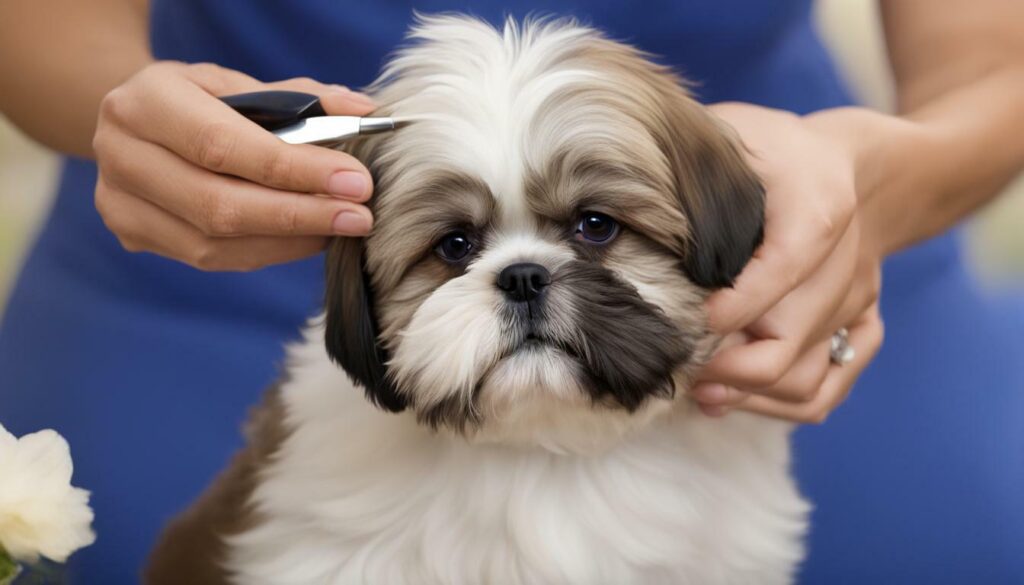
In addition to providing your Shih Tzu with a comfortable living environment, regular exercise, and proper grooming, ensuring their diet is nutritionally adequate is essential for maintaining their overall health and well-being.
Commercial dog food is a popular and convenient option for feeding your Shih Tzu, and selecting a high-quality brand is crucial. Look for foods that list a protein source like chicken, lamb, or beef as the first ingredient. Avoid brands that use fillers such as corn, wheat, and soy, as these can cause digestive issues in some dogs.
If you prefer to feed your Shih Tzu homemade meals, consult with your veterinarian or a veterinary nutritionist to ensure the meals are nutritionally balanced and meet your dog’s specific dietary needs.
Portion control is also important to prevent your Shih Tzu from becoming overweight, which can lead to health problems like joint pain and heart disease. Feed your Shih Tzu small, frequent meals throughout the day rather than one or two large meals.
Treats can be a great way to reinforce positive behavior and provide a tasty snack for your Shih Tzu. However, it’s important to choose healthy options that won’t upset their stomachs or contribute to weight gain. Look for treats made with natural ingredients, like fruits and vegetables, and avoid products with high sugar or fat content.

Shih Tzu Exercise Requirements: Keeping Them Active
Despite their small size, Shih Tzus require daily exercise to maintain their physical and mental well-being. Adult Shih Tzus require at least 30 minutes of exercise each day, while puppies may need shorter, more frequent play sessions.
Walking is an excellent form of exercise for Shih Tzus. It provides them with opportunities for mental stimulation and socialization while allowing them to burn off excess energy. Aim for at least two walks a day, each lasting around 15 minutes.
In addition to walking, consider engaging your Shih Tzu in indoor playtime. Shih Tzus love toys, and games such as fetch and tug-of-war can provide both mental and physical stimulation. You can also create an obstacle course for your Shih Tzu to jump over or crawl under.
When exercising your Shih Tzu, ensure that the exercise is moderate and appropriate for their age, size, and level of fitness. Over-exercising or engaging your Shih Tzu in high-impact activities such as jumping or running on hard surfaces can lead to injuries.
Regular exercise can not only keep your Shih Tzu healthy but also prevent behavioral problems such as excessive barking and destructive chewing. Make exercise a part of your Shih Tzu’s daily routine to ensure they lead a happy, healthy life.

As a responsible owner, you want to make sure your Shih Tzu stays safe and healthy. However, hazards can lurk in unexpected places, and it’s up to you to identify and eliminate them. To ensure your Shih Tzu’s safety, take the time to pet-proof your home and yard.
Pet-Proofing Your Home
Begin by taking a walk around your home and identifying potential hazards. Some common dangers for Shih Tzus include:
| Danger | Solution |
|---|---|
| Toxic Substances | Keep household cleaners, medications, and other dangerous substances out of reach or behind closed cabinets. |
| Choking Hazards | Remove small objects that your Shih Tzu could potentially choke on. This includes kids’ toys, pens, and other small items. |
| Sharp Objects | Remove sharp objects, such as exposed wires or broken glass, that your Shih Tzu could accidentally injure itself on. |
| Dangerous Plants | Some plants can be toxic to your Shih Tzu, including lilies, poinsettias, and daffodils. Make sure to keep these plants out of your home and away from your yard. |
By following these pet-proofing tips, you can help prevent accidents and keep your Shih Tzu safe in your home.
Pet-Proofing Your Yard
Your yard can also pose safety hazards for your Shih Tzu. Take these steps to ensure your yard is safe for your furry friend:
- Install a secure fence or barrier to keep your Shih Tzu from wandering off or accidentally escaping.
- Remove any hazardous objects, such as sharp rocks or garden tools, that your Shih Tzu could injure itself on.
- Check your yard regularly for poisonous plants, such as mushrooms or ivy, that your Shih Tzu could accidentally ingest.
Additionally, never leave your Shih Tzu unsupervised in your yard, as they could get into trouble or encounter unexpected hazards.

By implementing these pet-proofing tips, you can create a safe and secure environment for your Shih Tzu. With your help, your furry companion can live a happy, healthy, and hazard-free life.
Conclusion: Providing a Lifetime of Love and Care for Your Shih Tzu
As you embark on your journey as a Shih Tzu owner, it’s essential to remember that your furry companion relies on you for their health and well-being. By following the advice in this comprehensive Shih Tzu ownership guide, you can ensure your pet lives a happy, comfortable life.
From daily care routines to grooming, training, and socialization needs, this guide covers all aspects of Shih Tzu ownership. You’ll learn how to keep your Shih Tzu healthy, active, and safe in their environment, providing them with a lifetime of love and care.
Remember to consult with your veterinarian with any specific questions or concerns you may have about your Shih Tzu’s health or behavior. With patience, dedication, and love, you can be a responsible and caring owner for your Shih Tzu.
Thank you for choosing to provide a loving home for your Shih Tzu. We wish you and your furry friend a long, happy life together.
FAQ
What is the Shih Tzu breed known for?
The Shih Tzu breed is known for its friendly and affectionate nature.
How often should I groom my Shih Tzu?
Shih Tzus should be groomed regularly, ideally every 4-6 weeks, to maintain their coat’s health and appearance.
Are Shih Tzus good with children?
Yes, Shih Tzus are generally good with children and can be a great family pet with proper socialization.
Do Shih Tzus require a lot of exercise?
While Shih Tzus do not require extensive exercise, they still need daily walks and playtime to stay healthy and happy.
What are common health issues in Shih Tzus?
Shih Tzus are prone to certain health issues such as eye problems, dental disease, and allergies.
How can I potty train my Shih Tzu puppy?
Consistent crate training and positive reinforcement techniques can help in potty training your Shih Tzu puppy.
What should I feed my Shih Tzu?
A balanced diet consisting of high-quality dog food formulated for small breeds is recommended for Shih Tzus.
How can I socialize my Shih Tzu?
Socialize your Shih Tzu by exposing them to different people, animals, and environments from a young age and continuing throughout their life.
What are potential hazards for Shih Tzus in the home?
Potential hazards for Shih Tzus in the home include toxic plants, cleaning chemicals, and small objects that can be choking hazards.
When should I take my Shih Tzu to the veterinarian?
Regular veterinary check-ups are important for your Shih Tzu’s overall health. Consult your veterinarian for the recommended schedule.

Marissa Delotta, 36, from Dayton, Ohio, is the creative force behind Roverboard.com, a beloved online destination for dog lovers. As a dedicated mom and canine enthusiast, Marissa combines her family experiences with her love for dogs to offer a platform where dog owners can exchange tips, heartwarming stories, and advice. Her website has become a vibrant community for sharing the joys of dog parenting. In her free time, Marissa enjoys exploring dog parks with her family and volunteering at local animal shelters.

